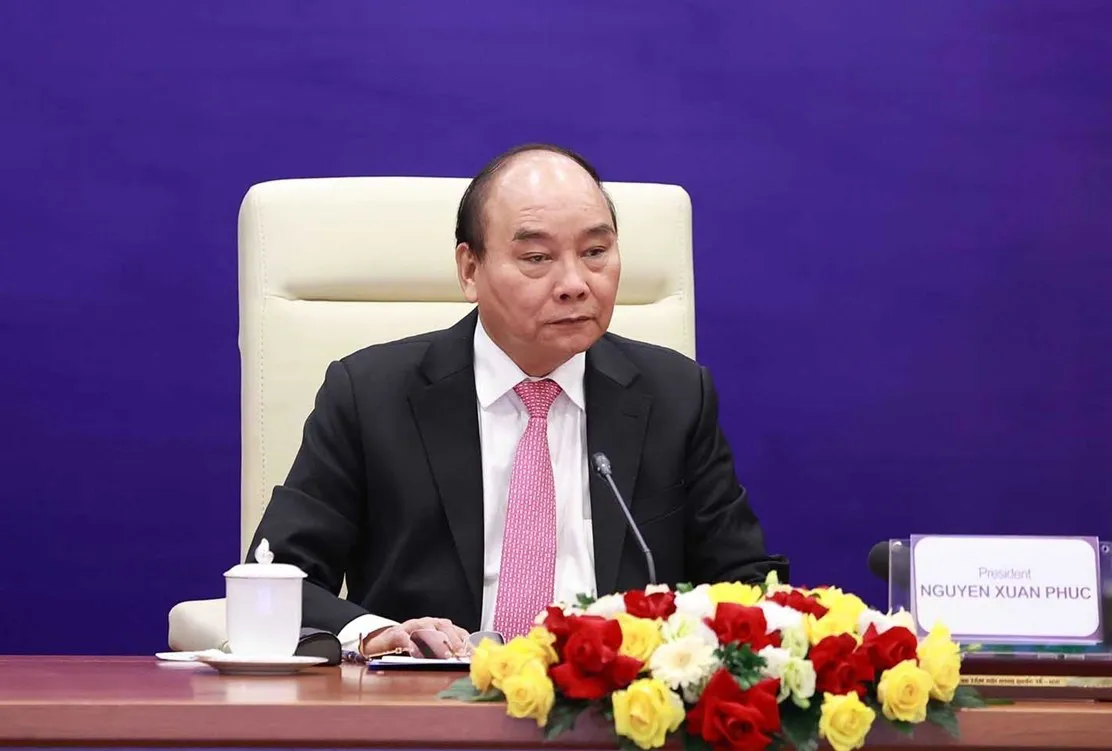Vietnam welcomes APEC investors for shared prosperity: State President
Vietnam creates every condition for businesses to succeed, State President Nguyen Xuan Phuc has said.
Vietnam welcomes investors from APEC and countries around the world to do business in the country as the Government is pushing for a comprehensive economic recovery in a new normal.
| State President Nguyen Xuan Phuc at the dialogue. Photo: VNA |
State President Nguyen Xuan Phuc gave the remarks in the virtual APEC Business Advisory Council (ABAC) Dialogue with APEC Economic Leaders on November 11.
The event, chaired by New Zealand Prime Minister Jacinda Arden, drew the participation of leaders from 21 APEC economies and 63 members of the ABAC representing leading businesses in the region.
In his speech, State President Phuc highlighted the contribution of APEC’s business community in response to the Covid-19 fight and the role of ABAC as an advisory body for APEC leaders.
According to Phuc, countries around the world are in need of comprehensive and drastic approaches in dealing with unprecedented challenges, in which each country’s own efforts and global cooperation should go hand in hand.
“Each country should work to ensure a speedy economic recovery, which would lay the foundation for a similar process at regional and global scales,” he said.
In the meantime, global economic cooperation in trade/investment facilitation and supporting supply chains would have positive impacts on each economy, Phuc continued.
“APEC should be the platform to push for new opportunities and promote economic linkage in transiting towards a digital economy, green growth, and climate resilience,” he added, saying the benefits of the people should always be of priority in every process.
Phuc reaffirmed Vietnam’s strong commitments in realizing net-zero carbon emissions by 2050, along with a 30% reduction in methane emission by 2030 and raising the proportion of renewables in the total primary power supply by over 30%.
He said the Vietnamese Government is taking steps to push for economic recovery in a new normal, with a focus on digital transformation, green growth, and climate resilience.
In this regard, Phuc said every policy for economic recovery should be centered around businesses and the people, while social resources and supporting programs are mobilized to support socially vulnerable groups.
Phuc noted efforts to promote green growth and combat climate change are being carried out in Vietnam via incentives to develop environmentally-friendly economic sectors, along with a push for innovation and green businesses.
In addition, Vietnam continues to ensure smooth operation of supply chains and improve the business environment to reach international standards by realizing the country’s commitments in free trade agreements, including new-generation deals such as CPTPP, EVFTA, or RCEP.
“Vietnam creates every condition for businesses to succeed,” Phuc stressed.
At this difficult time, Phuc said this is also an opportunity for businesses to restructure their operation and enhance competitiveness for inclusive and sustainable development.
“Ambitious goals set by APEC members on economic recovery and climate response could only be realized when the APEC community joins hands in cutting carbon emission and invest in renewable projects, or form green supply chains,” he continued.
Phuc expected every member to continue contributing to a peaceful region with sustainable development and prosperity.
The dialogue is a platform for APEC members to discuss ways to accelerate recovery from the pandemic and promote an inclusive, sustainable and prosperous future for all. The APEC is composed of 21 member-economies: Australia, Brunei, Canada, Chile, China, Hong Kong (China), Indonesia, Japan, South Korea, Malaysia, Mexico, New Zealand, Papua New Guinea, Peru, the Philippines, Russia, Singapore, Taiwan (China), Thailand, the US, and Vietnam. Established in 1989, APEC accounts for about three billion people, half of the global trade, 60% of total GDP, and much of the world’s growth. Vietnam officially joined APEC in 1998 and hosted the APEC Summit twice in 2006 and 2017. |













